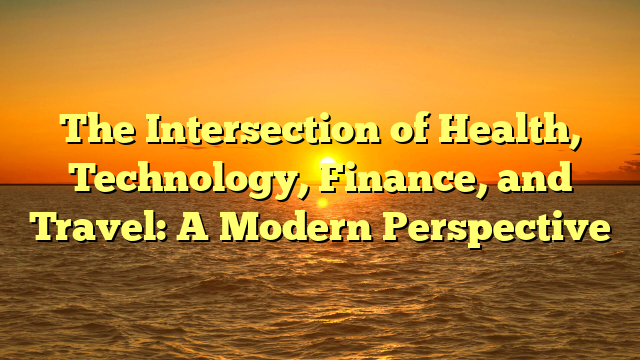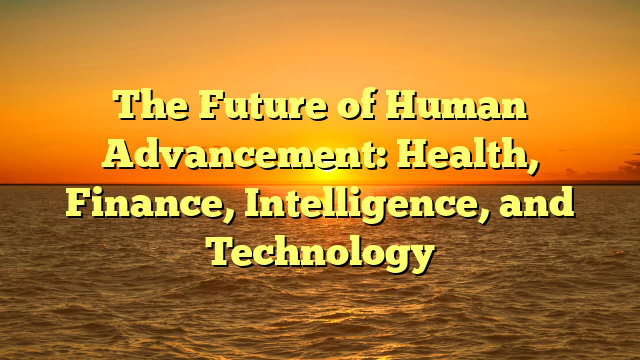In today’s rapidly evolving world, the integration of various fields such as health, technology, finance, and travel plays an important role in shaping our daily lives. Each of these domains contributes significantly to improving the quality of life, creating new opportunities, and revolutionizing industries. As we move further into the digital age, the boundaries between these areas are becoming increasingly blurred. This article will explore how these four areas—health, technology, finance, and travel—are interconnected and the impact they have on modern society.
Healthcare and Technology: A Powerful Duo
The intersection of health and technology has brought about monumental changes in the way we approach healthcare services. Advances in medical have led to groundbreaking innovations such as telemedicine, wearable health devices, and AI-powered diagnostics. These technological advancements not only improve the accuracy of medical diagnoses but also offer patients faster and more efficient treatments.
Telemedicine, for example, has become increasingly popular, especially during the COVID-19 pandemic. It allows patients to consult with healthcare professionals remotely, reducing the need for in-person visits and offering greater accessibility to people in rural or underserved areas. This has significantly transformed the way people access healthcare, improving convenience and cutting down on travel time for doctor visits.
Wearable technology, such as fitness trackers and smartwatches, has also had a profound impact on health. Devices like these enable users to monitor vital signs, such as heart rate, sleep patterns, and physical activity. This real-time data collection encourages individuals to make healthier choices and take a proactive approach to their well-being. Furthermore, health professionals can analyze this data to identify potential health risks early, leading to better preventive care.
Financial Services and Innovation: A New Era of Digital Finance
Technology has also brought a transformation to the finance industry, introducing new tools and platforms that offer greater convenience, transparency, and accessibility. Financial technology, often referred to as fintech, encompasses a wide range of services, from digital payment systems to blockchain and cryptocurrency.
One of the most significant advancements in the financial sector is the rise of digital wallets and payment apps like PayPal, Venmo, and Apple Pay. These services make it possible to send money, pay for goods, and manage finances from the convenience of a smartphone, offering users greater flexibility and control over their financial transactions.
Selot Online Cormen Terpercaya , which underpins cryptocurrencies like Bitcoin and Ethereum, is also reshaping the way we think about money. It enables secure, decentralized transactions without the need for intermediaries like banks. This technology promises to disrupt traditional financial systems and offer new ways to manage assets, investments, and transactions.
Moreover, the growth of robo-advisors and AI-driven investment platforms is changing the way individuals approach investing. These tools use algorithms to analyze market trends, create personalized investment portfolios, and offer financial advice, making it easier for people to manage their investments without the need for traditional financial advisors.
Tourism and Technology: The Future of Exploration
The travel and tourism industry has also experienced a dramatic transformation due to technological advancements. From the way we book trips to the methods of transportation we use, technology has made traveling more accessible, efficient, and enjoyable than ever before.
One of the most significant changes in the travel industry has been the rise of online travel agencies (OTAs) such as Expedia, Booking.com, and Airbnb. These platforms allow travelers to easily search for flights, hotels, and vacation rentals, compare prices, and read reviews. The convenience of booking travel online has made it easier for people to plan and book trips with just a few clicks.
Moreover, technology has enhanced the way we experience travel. Augmented reality (AR) and virtual reality (VR) are beginning to play a larger role in tourism, offering immersive experiences that transport users to new destinations without leaving their homes. Some museums and historical sites offer virtual tours, allowing users to explore ancient ruins or art galleries in 3D. In the future, we could see even more advanced VR experiences that replicate real-world destinations.
Transportation has also undergone a revolution thanks to technology. Electric vehicles (EVs) and autonomous vehicles are changing the way we think about transportation. Companies like Tesla and Waymo are pushing the boundaries of what’s possible with self-driving cars, while electric planes and high-speed trains promise to reduce travel time and carbon footprints.
Additionally, the advent of blockchain in the travel industry offers new opportunities for streamlining and securing travel bookings. Blockchain can be used to ensure the authenticity of travel documents, secure transactions, and create loyalty programs that are more transparent and efficient.
Healthcare and Investment: An Evolving Relationship
The connection between health and finance is often overlooked, but it plays a crucial role in the overall well-being of individuals and societies. Healthcare costs have been rising for years, and many people struggle to afford necessary medical treatments. This has created a growing demand for financial solutions that can help individuals manage healthcare expenses.
Health insurance is one of the primary ways that people protect themselves from the financial burden of medical costs. However, the traditional health insurance model is not always flexible or affordable for everyone. Recent trends in health finance, such as health savings accounts (HSAs) and medical crowdfunding, offer individuals more options to manage their healthcare expenses. These solutions give people more control over their health finances and allow them to save money for future medical expenses.
Additionally, investors are increasingly looking at the health sector as a viable area for growth. The rise of healthtech startups has attracted significant investments, as venture capitalists and institutional investors recognize the potential for innovation in healthcare. This has led to the development of new technologies and services that make healthcare more accessible, efficient, and affordable for people around the world.
The Future: A Harmonious Integration of Health, Technology, Finance, and Travel
As technology continues to advance, we can expect even greater integration between health, finance, technology, and travel. The convergence will create new opportunities for individuals to live healthier, more financially secure, and fulfilling lives.
In the near future, we may see the widespread use of AI-powered health assistants that provide personalized health recommendations based on an individual’s medical history and lifestyle. These assistants could also integrate with financial tools to help people manage their healthcare costs and investments.
In the travel sector, we could witness the development of fully autonomous travel experiences, where AI and robotics handle everything from transportation to personalized itineraries. This could make travel more efficient and enjoyable, allowing people to focus on the experience rather than the logistics.
In the end, the intersection of health, technology, finance, and travel will continue to shape the way we live, work, and explore the world. By embracing these advancements, we can create a more connected, healthy, and prosperous future for everyone.
The Intersection of Health, Technology, Finance, and Travel: A Modern Perspective

